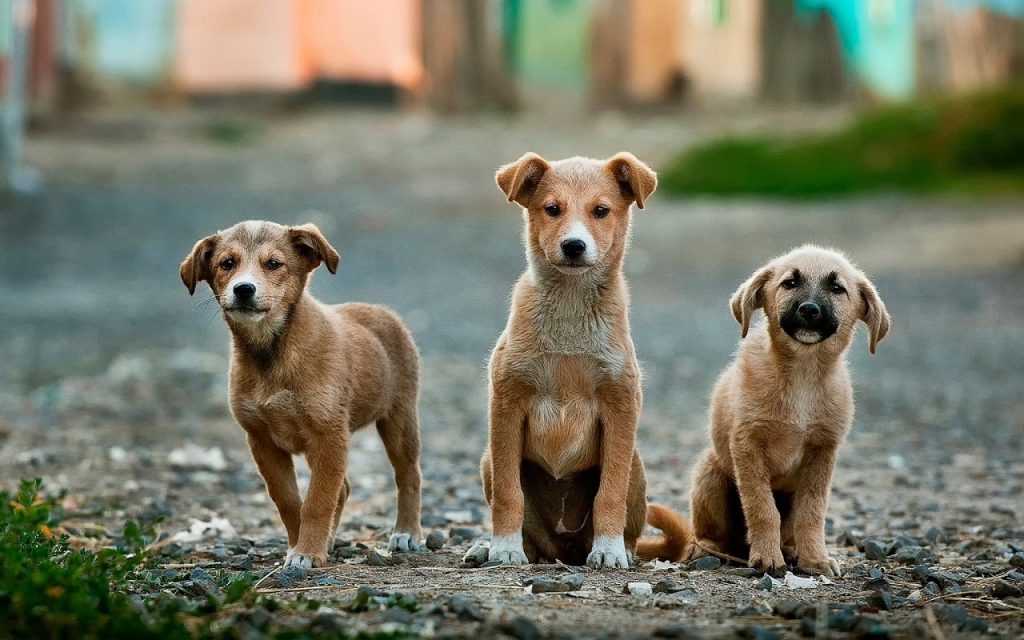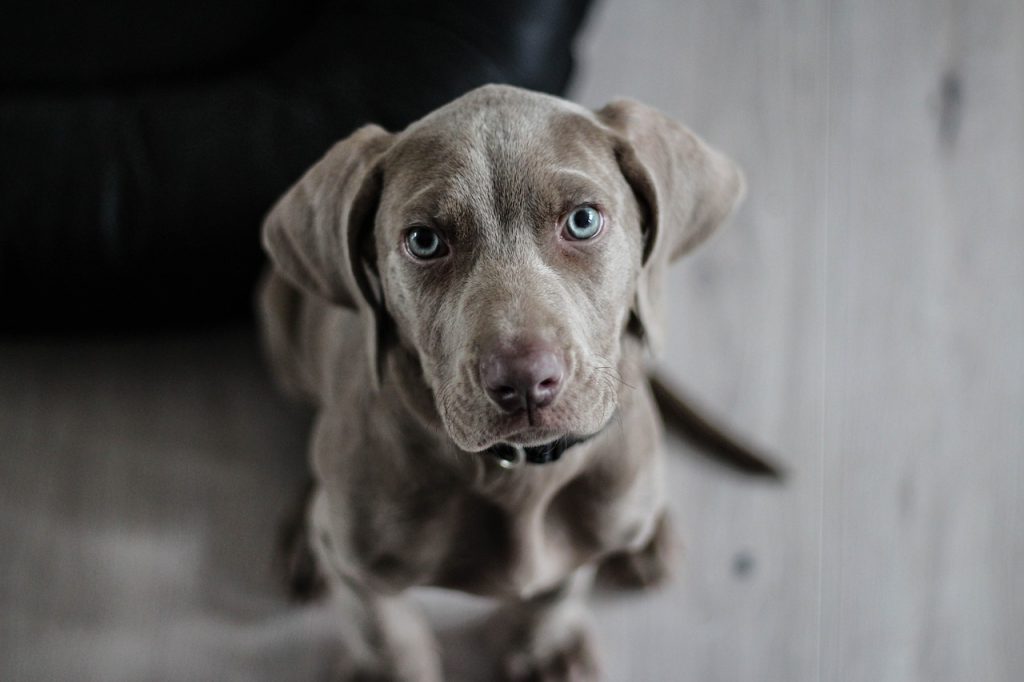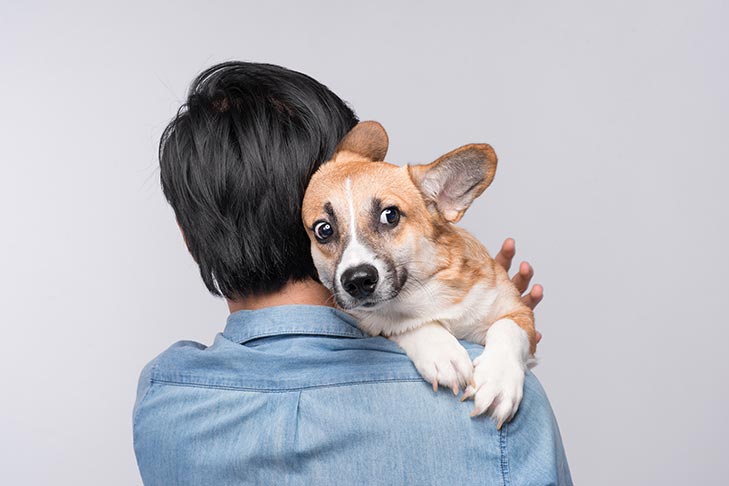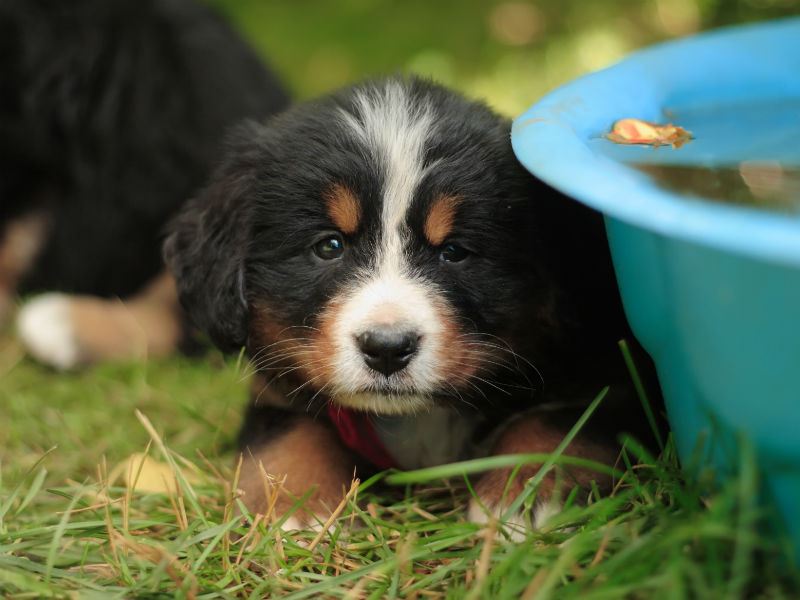To train a puppy, first you have to know that fear in puppies can hinder their abilities and themselves from living a full and lively life.
They become afraid from things and people which can make them feel afraid all the time and they can’t get passed their fear.
Table of Contents
Signs that your puppy is afraid
There are many signs that your puppy is afraid. Some of these signs are that your puppy hides, has a rounded body, tucks their tail, yawns, licks their lips, shakes, freezes, whines, urinates, and runs away and jumps into your lap for safety.
Causes of a puppy feeling fear

There are different common puppy fears. By identifying these fears, you are more likely to know what is scaring your puppy and work on making your puppy gain confidence.
The causes are:
- Separation anxiety when being left alone too soon.
- Other new dogs
- Other species of animals
- Sounds that startle them
- Stairs
- Riding in cars
- Meeting new people
- Visits to the vet
- Abuse
- Lack of social experiences
- Genetic predisposition
Top best ways to train a puppy to stop feeling afraid
1.) Stay calm
You got to first ,as a person, stay calm. Don’t get angry or impatient with your puppy. Also don’t laugh at him because this is a serious problem that your puppy is facing.
Shouting and being impatient will worsen the problem causing your puppy to even become fearful of you.
While laughing it off is dangerous because you are underestimating your dog’s fear and it will continue to grow if there is no intervention.
By staying calm, you are helping your puppy and making a calm environment that is needed to build their confidence and reduce their fears.
2.) Identify what your puppy is scared from
Look and examine your puppy behavior what are they afraid off. Also, think of who the puppy is afraid off and the situation that stimulates the fear.
You can start by making a list of the people and the situations that your puppy is afraid of. Maybe your puppy is afraid of children or maybe they are afraid of strangers.
After you write down who are the people and what are the situations that your puppy gets anxious in, you can apply certain techniques to train a puppy to stop feeling fear.
3.) Managing a scared puppy

The first technique is management of your puppy. In management, you avoid the problem or the thing that triggers the problem.
Management is only a temporary solution as it doesn’t solve the problem. It only prevents dog fear response from happening.
Management can also lower your dog’s stress level and create an atmosphere that is suited for training and behavior changing.
For example if your dog is afraid of strangers, you could avoid crowded areas with strangers. You could also put yourself between the stranger and your dog when in a situation.
In this situation, you only help avoid your dog’s fear but you aren’t solving it. It is a crucial step in the beginning only.
4.) Slowly reintroduce them to the feared object or people
In this step, slowly expose them to their feared situation or people. Use positive reinforcement as a tool to change their fearful behavior by offering them treats and praise when they slowly confront their fear.
It is important to pay attention to your puppy’s emotional state on every step of the process.
You have to keep sessions short when exposing them to new situations and people; sessions should be from 3 to 5 minutes.
While along the days, you could extend sessions time bit by bit so your puppy would get accustomed to the small change and can deal in the situation.
5.) Train a puppy for confidence
Basic training such as teaching your puppy simple behaviors such as sit, down, and stay can help build your puppy’s confidence. These types of trainings lay a foundation for your puppy to look to you when they are uncertain.
There are other training exercises for your puppy.
- Ask your puppy politely for anything: Give them treats and praise when they do what you asked them to do. Remember don’t be harsh when training them.
- Reward them: Reward your puppy when they do positive behaviors on their own. An example would be if your puppy approaches a child who they used to be afraid from.
6.) Give your puppy a regular routine
Puppies love routine so establishing it will help them understand the timings of things and situations. This means a regular daily schedule of mealtimes, naps, playtime, and training sessions.
As a result, your puppy will feel secured.
7.) Don’t reassure and coddle your fearful puppy

Reassuring and coddling your puppy when they are afraid will make the situation worse. It will reinforce your puppy’s fear that there is something to be afraid of.
Instead, you got to be calm when your puppy is feeling afraid. Your puppy is more likely to look to you for what to do. So by being calm, you make sure that your puppy also stays calm.
8.) Give your puppy regular socialization
Provide your puppy with regular socialization. It is an important aspect of puppy’s development because it allows them to not become afraid of people, other dogs, noises, and other things.
Socialization allows for your puppy to grow their confidence.
9.) Seek professional help
If your puppy is too afraid and the techniques you tried are not helping, then the best solution is to seek professional help.
You can contact a positive reinforcement trainer, a veterinarian, or a veterinary behaviorist. These people are best suited to help you in treating your puppy when they are feeling afraid.
Conclusion
In conclusion, puppies become afraid due to different reasons. It is important to know what reasons that make your puppy afraid and tackle them. You have to always be patient, understanding, and calm when dealing with your puppy in this situation.
Do not rush the process and get angry at your puppy. This behavior is likely to backfire and cause your puppy additional fear.

